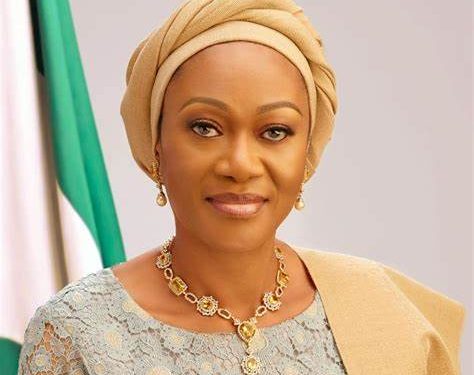Nigeria’s First Lady, Oluremi Tinubu, has opened up about the complexities of her role as the president’s wife, describing it as both challenging and highly sensitive during a prestigious international gathering focused on addressing global crises.
Speaking at the 3rd Annual Global First Ladies Alliance Academy at Columbia University on Wednesday, Senator Tinubu joined nine other current first ladies from around the world in a high-level discussion on urgent issues including artificial intelligence advancement, food security challenges, and the growing mental health crisis among young people.
The influential gathering brought together first ladies from Nigeria, Angola, Armenia, Belize, Guatemala, Iceland, Malawi, Mozambique, Panama, and Sierra Leone, alongside several former first ladies who shared their experiences and insights on global leadership challenges.
During her address to the distinguished assembly, Tinubu candidly reflected on the delicate balance required in her position, emphasizing how her actions directly impact her husband’s presidency and the nation’s progress.
“This position is quite challenging. What you do will either complement your husband or be a burden to him. So please do what you can and do it right,” she told her international counterparts, offering advice born from her own experiences navigating the complex world of presidential partnerships.
The Nigerian First Lady encouraged her peers to embrace their capacity for meaningful change, regardless of the scale of their individual contributions. “Don’t be afraid to give your little. That little could be a lifesaver for someone. Be bold to confront your challenges, and that is what we are doing, and we are beginning to see the impact gradually,” she stated.
Tinubu highlighted her work through the Renewed Hope Initiative (RHI), her flagship program dedicated to advancing women and youth development across Nigeria. The initiative represents her commitment to addressing critical social issues and creating opportunities for vulnerable populations throughout the country.
The First Lady called for innovative approaches to support Nigeria’s most vulnerable citizens, emphasizing the need for creative solutions that can address systemic challenges while building sustainable pathways to empowerment and development.
The academy’s agenda focused on several pressing global concerns that transcend national boundaries and require coordinated international responses. Mental health and well-being among youth emerged as a central theme, with participants discussing strategies to address the growing crisis affecting young people worldwide.
Maternal health also featured prominently in discussions, as first ladies shared successful initiatives from their respective countries and explored collaborative approaches to reducing maternal mortality rates and improving healthcare access for women.
Food security challenges dominated another major segment of the gathering, with participants examining how climate change, conflict, and economic instability are creating unprecedented threats to global nutrition and agricultural sustainability.
The rapid advancement of artificial intelligence technology provided another focal point for the international leaders, who discussed both the opportunities and risks associated with AI development and implementation across different sectors of society.
The Columbia University setting provided an academic backdrop for the high-level conversations, with researchers and policy experts contributing to discussions about evidence-based approaches to addressing these complex global challenges.
The Global First Ladies Alliance Academy represents a unique platform for presidential spouses to leverage their positions for meaningful social impact, moving beyond traditional ceremonial roles to engage directly with policy discussions and international cooperation efforts.
For Tinubu, the gathering provided an opportunity to showcase Nigeria’s approaches to social development while learning from successful initiatives implemented by her international counterparts. Her participation underscores the Tinubu administration’s commitment to engaging with global partners on shared challenges.
The First Lady’s candid remarks about the challenges inherent in her role resonated with participants who face similar pressures in balancing public expectations, political considerations, and personal convictions while working to advance their respective nations’ interests.
As the academy concluded, participants committed to continuing their collaborative efforts and sharing resources to address the pressing challenges facing their countries and the global community at large.
The gathering reflects a growing recognition of the influential role that first ladies play in shaping social policy and international relations, moving beyond traditional diplomatic protocols to engage in substantive discussions about solutions to complex global problems.

















